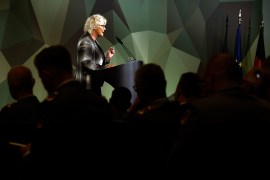Life often unfolds in unexpected ways, and in the world of politics, it frequently takes surprising turns. Recently, German Defense Minister Christine Lambrecht addressed the nation in Berlin, outlining her vision for the country’s role in the international arena. In her speech, she boldly asserted that Germany, due to its size, geographical location, economic prowess, and overall influence, was destined to be a “leading power in Europe, whether we like it or not.”
However, this proclamation of leadership comes at a time when Germany’s political landscape is undergoing significant changes. The Foreign Ministry is in the process of drafting Germany’s first-ever national security strategy, a task that carries immense responsibility and potential consequences. Moreover, within her own political party, the Social Democratic Party (SPD), there are vocal skeptics who are wary of what they perceive as “chic bellicism” or an emerging appetite for military engagement.
Minister Lambrecht faces the challenging task of asserting her authority and ensuring that the momentum generated by SPD Chancellor Olaf Scholz’s commitment to a new era, or “Zeitenwende,” following Russia’s attack on Ukraine, is not lost. This commitment extends to robust funding for the military, a critical component in securing Germany’s leadership ambitions.
However, the immediate concern for her audience, both domestically and among Germany’s allies, is the pressing issue of Ukraine’s desperate need for heavy weaponry. Contrary to expectations and to the surprise of many, Ukraine’s military forces have achieved remarkable successes in repelling the invaders, regaining significant territory in a remarkably short period. This achievement has outstripped Russia’s territorial gains during the preceding five months.
While cautious optimism is warranted, it is important to remember that challenges persist. The possibility of a Russian defeat, while emerging as a realistic prospect, hinges on Ukraine’s ability to maintain its momentum along the extensive frontline. As Ukrainian Foreign Minister Dmytro Kuleba emphasized to his German counterpart Annalena Baerbock, this feat is contingent upon receiving armored infantry carriers and battle tanks.
In response to these urgent pleas, Minister Lambrecht, echoing Chancellor Scholz’s position, argued that Germany should not take unilateral actions. She highlighted that no other NATO ally had delivered Western-made infantry fighting vehicles or main battle tanks, and such actions could potentially escalate the situation, causing Vladimir Putin to perceive Germany as a direct participant in the conflict. Crossing this threshold is a red line that Germany’s ruling coalition, comprised of three parties, is keen to avoid.
This dilemma has sparked a heated debate in Berlin over the delivery of heavy weaponry. Leaders from various political parties have expressed their views, with calls for immediate action. Some have underscored that the time for hesitation has passed. Germany’s coalition partners, including the Greens and the Free Democrats, have demanded swift deliveries of infantry carriers and tanks.
Interestingly, even the U.S. Embassy in Berlin weighed in on the matter, emphasizing that while the U.S. appreciates Germany’s contributions, allies should support Ukraine to the fullest extent possible. This diplomatic intervention subtly communicated to Germany that it should take decisive action without waiting for external direction.
In truth, Germany’s current stance is untenable. Other NATO allies have already supplied Ukraine with armored infantry fighting vehicles and tanks. Some have even delivered modernized Soviet-era tanks. The equipment Germany has sent, including Gepard armored air defense systems and Panzerhaubitze 2000 howitzers, has significantly aided Ukraine’s counteroffensive, as acknowledged by Kyiv. NATO Secretary-General Jens Stoltenberg has called on all allies to prioritize deliveries to Ukraine. The Russian ambassador has suggested that red lines have already been crossed.
The primary concern regarding Leopard 2 tanks is the training required to operate these sophisticated machines, which could take three to four months. However, Ukraine has demonstrated its capacity for rapid learning, and Russia still occupies a considerable portion of Ukrainian territory. Sending tanks now would send a powerful signal to the Kremlin that Germany will not be intimidated.
During the Cold War, leaders of West Germany often cited three compelling reasons (Zwang) why they could not take certain actions: policies, allies, and constraints (Normzwang, Bündniszwang, and Sachzwang). These reasons often served as justifications for inaction. More than three decades have passed since the fall of the Berlin Wall, granting Germany full sovereignty. It is time for Germany to shed this disingenuous habit and uphold the responsibilities that come with its aspirations for leadership in Europe.




